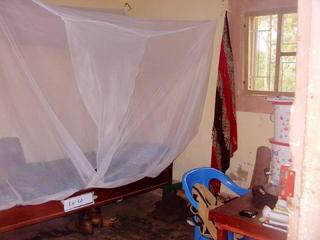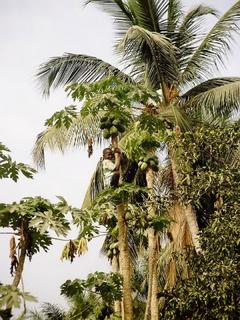During the 10-week training we lived with home stay families in the villages of Yorokogiya, Gberiyere, and Km5. I lived with the Camara family in the small village of Yorokogiya. I had a mom, dad, grandmother, aunt, and lots of brothers and sisters. Some weren't "real" brothers and sisters in American terms; we would consider them cousins or extended family. But they were so much a part of my immediate home stay family that it took a long time to figure out which kids came from where. I'm still a bit unsure. My beautiful brothers and sisters: Ibrahima, Mariama, Marissa, Aicha, Mamata, Solomon, Sakhou, Ali, Mohammed, and Salematou. I was called Aicha Camara.
 My homestay family, the Camaras
My homestay family, the Camaras
 Homestay house; my doorway has the pink curtain
Homestay house; my doorway has the pink curtain
 Kids in my homestay family; from back: Mariamba, Aicha, Sekou, Salematou, neighbor
Kids in my homestay family; from back: Mariamba, Aicha, Sekou, Salematou, neighbor

My room
I showed up in Yorokogiya with a scratchy voice. I was a bit too excited during my first week in country and had lost my voice. Some of the families at the Adoption Ceremony definitely thought I was possessed. It was a bit awkward.
I was shocked one day to turn and see my tiny brother Ali at the top of a palm tree harvesting a coconut for my mom. My sister Marissa convinced my cousin Fatimata (who lived with us for 2 weeks or so) that I was possessed since I had white skin and blue eyes. Fatimata was terrified of me for the first few days until I convinced her that Marissa was being ridiculous.

Ali getting a coconut for his mom
 Mariamba with her new baby, Fatimata, Aicha, Marissa
Mariamba with her new baby, Fatimata, Aicha, Marissa
Each sector (agroforestry, health, and business development) had training classes and exercises based in its village. The 10 agroforestry trainees managed a small organic garden in a space in the lowlands given to us by the village of Yorokogiya. While hoeing the rows with the African dabas (hoes), we discovered huge mean biting ants (and suddenly realized why our village picked such a nice spot for our garden). Our Guinean trainers taught us many agroforestry techniques including basic gardening, mud stove construction to increase wood fuel efficiency, fruit tree grafting, solar drying and cooking, and reforestation.
 Agroforestry training in the garden
Agroforestry training in the garden

Agroforestry building a mudstove (mudstoves capture heat, improving efficiency, and reducing wood required for fuel)

Agroforestry trainees after the talent show performance
Some sessions brought the entire training group together to discuss health and safety issues and Guinean culture. We studied French in small groups with Guinean language trainers and after a month of training, we found out where our sites would be and started local language training. My site is in the mountainous region in the middle of Guinea, the Fouta Djallon. I started learning Pular, the melodic language of the Peuhl people spoken by 14 million people in West Africa. 2.5 million people speak Peuhl-Fouta, the dialect they speak in Guinea.
We also had fun times bonding together with our fellow trainees. We all had Peace Corps mountain bikes so we could bike between villages to hang out. We played basketball on a random concrete court on top of a mountain behind Yorokogiya in a palm tree plantation. The court seriously seemed like basketball's version of "Field of Dreams." It's in the middle of nowhere with a lovely mountaintop view just steps from the court.

"Field of Dreams" basketball court above Yorokogiya

Group excursion by boat to islands off the coast of Conakry

Group excursion to Les Voiles de Mariees; (Bridal veil falls) near Kindia
We biked 18km to a Lebanese restaurant at the foot of huge cascades in the wet season. It was the dry season during training so the falls were reduced to a tiny trickle, but we could explore the riverbed above the falls and swim in the "lake." Two friends and I celebrated Easter with brunch there.
No comments:
Post a Comment